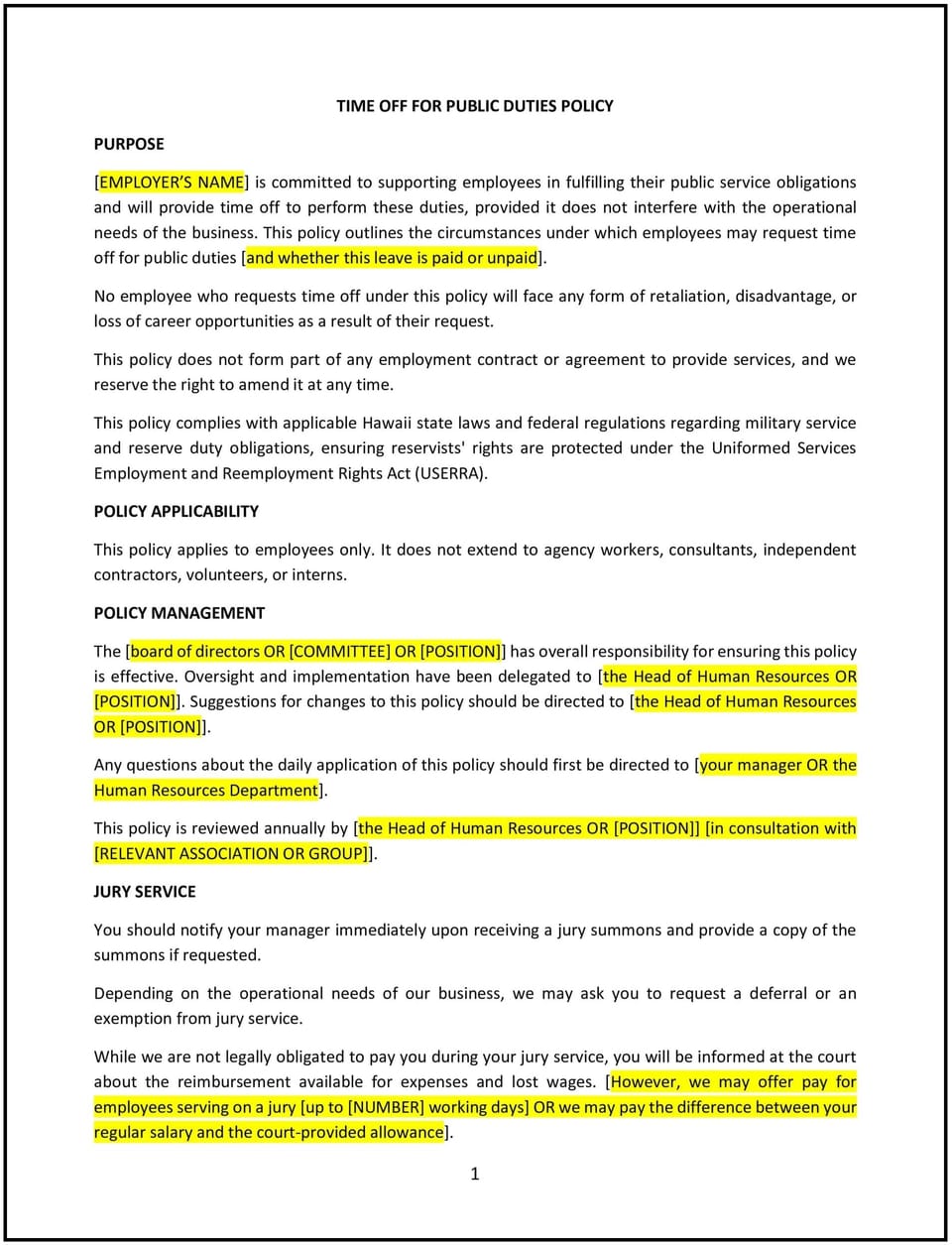Time off for public duties policy (Hawaii): Free template

Time off for public duties policy (Hawaiʻi)
A time off for public duties policy helps Hawaiʻi businesses support employees who need to fulfill civic responsibilities, such as jury duty, voting, or military service. This policy outlines procedures for granting time off, maintaining pay, and ensuring smooth operations during an employee’s absence. It is designed to promote civic engagement, support employees’ public duties, and align with Hawaiʻi’s cultural values of community and responsibility.
By implementing this policy, businesses in Hawaiʻi can demonstrate their commitment to supporting employees’ civic responsibilities while maintaining productivity and workplace morale.
How to use this time off for public duties policy (Hawaiʻi)
- Define public duties: Clearly explain what qualifies as public duties, such as jury duty, voting, military service, or other civic obligations.
- Establish eligibility: Specify which employees are eligible for time off, including full-time, part-time, and temporary workers.
- Outline pay policies: Describe whether employees will be paid during their absence for public duties, in alignment with Hawaiʻi state laws and business practices.
- Provide notice requirements: Explain how employees should notify the business of their need for time off, including advance notice and documentation.
- Address scheduling: Outline how the business will manage workloads and schedules during an employee’s absence to minimize disruptions.
- Communicate the policy: Share the policy with employees during onboarding and through internal communications to ensure awareness and understanding.
- Train managers: Educate managers on the policy’s guidelines, including how to handle requests for time off and maintain productivity during absences.
- Monitor and update the policy: Regularly review the policy’s effectiveness and make adjustments as needed to reflect changes in laws or business needs.
Benefits of using this time off for public duties policy (Hawaiʻi)
This policy offers several advantages for Hawaiʻi businesses:
- Supports civic engagement: Encouraging employees to fulfill public duties demonstrates the business’s commitment to community and civic responsibility.
- Enhances employee satisfaction: Employees appreciate support for their civic obligations, which can improve morale and loyalty.
- Builds trust: A clear and fair policy fosters trust between employees and management, even during absences.
- Aligns with state laws: The policy helps businesses comply with Hawaiʻi’s legal requirements for time off for public duties.
- Maintains productivity: Structured procedures for managing absences help minimize disruptions and ensure smooth operations.
- Promotes inclusivity: Supporting employees’ public duties reflects the business’s respect for their roles as active community members.
- Strengthens reputation: A policy that prioritizes civic engagement enhances the business’s reputation among employees, customers, and the community.
Tips for using this time off for public duties policy (Hawaiʻi)
- Communicate the policy effectively: Share the policy with employees during onboarding and through regular reminders, such as emails or posted notices.
- Provide clear guidelines: Ensure employees understand the process for requesting time off, including notice requirements and documentation.
- Train managers: Educate managers on how to handle requests for time off and manage workloads during employee absences.
- Be flexible: Work with employees to accommodate their public duties while maintaining business operations.
- Review the policy periodically: Update the policy as needed to reflect changes in laws, workplace dynamics, or business needs.
Q: Why should Hawaiʻi businesses adopt a time off for public duties policy?
A: Businesses should adopt this policy to support employees’ civic responsibilities, promote community engagement, and align with Hawaiʻi’s cultural values.
Q: What types of public duties are covered under the policy?
A: The policy should cover jury duty, voting, military service, and other civic obligations recognized by Hawaiʻi state law.
Q: Are businesses required to pay employees for time off for public duties?
A: Payment requirements vary by type of public duty. Businesses should follow Hawaiʻi state laws and consider their own practices when determining pay policies.
Q: How should employees notify the business of their need for time off?
A: Employees should provide advance notice and submit documentation, such as a jury duty summons or military orders, to request time off.
Q: How can businesses manage workloads during employee absences?
A: Businesses should plan ahead by redistributing tasks, adjusting schedules, or hiring temporary staff to minimize disruptions.
Q: What should businesses do if an employee’s public duties conflict with work responsibilities?
A: Businesses should work with the employee to find a solution that accommodates their public duties while maintaining business operations.
Q: How often should businesses review the policy?
A: Businesses should review the policy annually or as needed to reflect changes in laws, workplace dynamics, or business needs.
This article contains general legal information and does not contain legal advice. Cobrief is not a law firm or a substitute for an attorney or law firm. The law is complex and changes often. For legal advice, please ask a lawyer.


